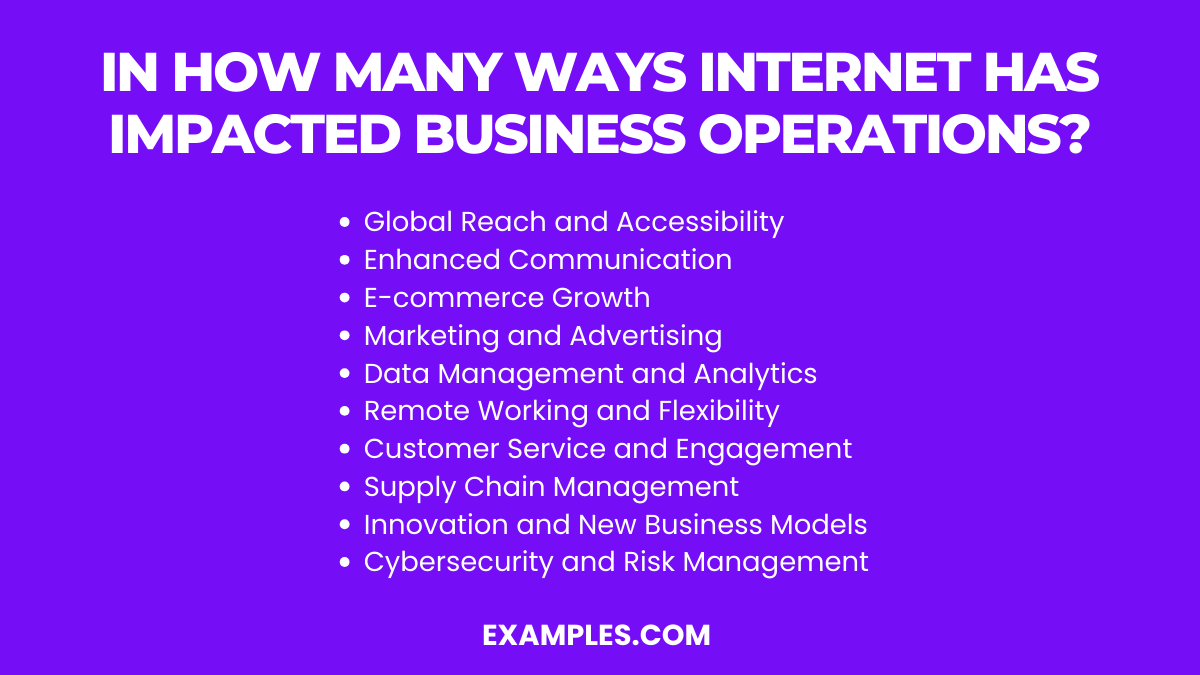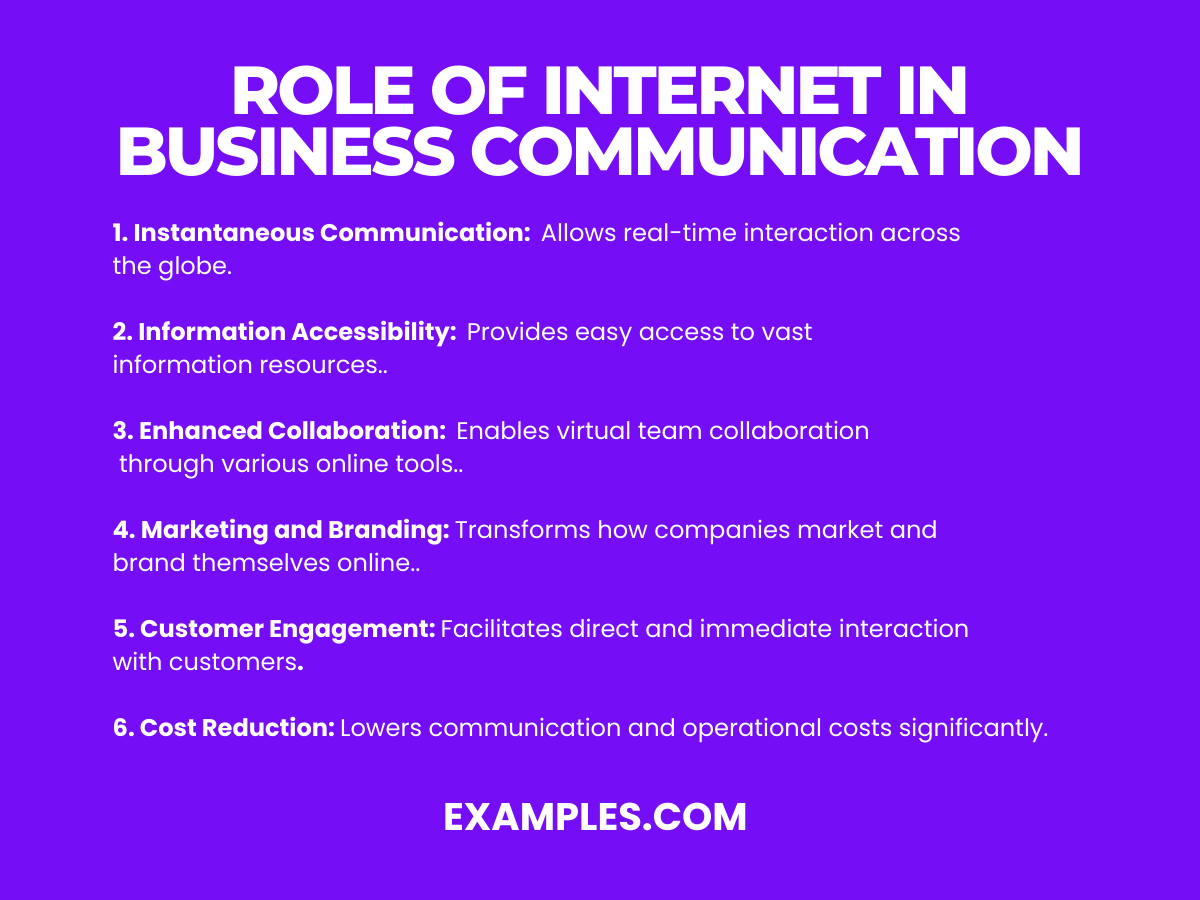How has the Internet Improved Business Communication?
The Internet has dramatically transformed business communication, introducing efficiency, speed, and broader reach. This comprehensive guide explores how digital platforms have enabled real-time Communication Examples, from emails and instant messaging to video conferencing and social media. It highlights the way the Internet has enhanced interaction among teams, streamlined business processes, and opened doors to global markets. With practical examples, this guide delves into the various facets of internet-facilitated communication, showcasing its profound impact on the corporate world.
Advantages of Internet in Business Communication
The advantages of the Internet in business communication are significant:
- Enhanced Speed and Efficiency: Instant communication across geographies.
- Cost-Effectiveness: Reduces travel and postal expenses.
- Accessibility: Available 24/7, facilitating timely interactions.
- Global Reach: Enables communication with international clients and teams.
- Multimedia Capabilities: Supports various formats like text, video, and audio.
- Improved Collaboration: Facilitates teamwork through collaborative tools.
- Real-Time Feedback: Allows immediate responses and adjustments.
- Data Storage and Retrieval: Easy access to archived communications
In How Many Ways Internet has Impacted Business Operations?
Transforming Business Operations: The Impact of the Internet
The internet has revolutionized business operations in numerous ways, fundamentally altering how companies operate, market, and interact with customers. Its pervasive impact has led to changes in various aspects of business, from communication and marketing to data management and customer service.
- Global Reach and Accessibility: The internet has erased geographical barriers, allowing businesses to reach a global audience. It enables companies to market and sell their products and services worldwide, leading to increased market penetration and customer base expansion.
- Enhanced Communication: With tools like email, instant messaging, and video conferencing, the internet has streamlined internal and external communication. It facilitates real-time, cost-effective communication with employees, suppliers, and customers globally.
- E-commerce Growth: Online shopping platforms have transformed retail, allowing businesses to operate 24/7 with a global reach. E-commerce provides convenience for consumers and reduces operational costs for businesses.
- Marketing and Advertising: Digital marketing, including social media, and email marketing, has become crucial. The internet allows targeted advertising, real-time customer feedback, and detailed analytics to refine marketing strategies.
- Data Management and Analytics: The ability to collect, store, and analyze vast amounts of data has improved decision-making. Businesses use data analytics for market research, customer behavior analysis, and to drive business strategy.
- Remote Working and Flexibility: The internet has enabled remote work, offering flexibility for employees and reducing overhead costs for businesses. Tools for project management, virtual collaboration, and cloud computing support this shift.
- Customer Service and Engagement: Online platforms have enhanced customer service, providing multiple channels for customer interaction, including social media, chatbots, and support forums. This leads to improved customer satisfaction and loyalty.
- Supply Chain Management: Internet technologies have streamlined supply chain operations, improving efficiency, tracking, and collaboration with suppliers. It has enabled just-in-time inventory systems and global sourcing.
- Innovation and New Business Models: The internet has spurred innovation, leading to new business models like subscription services, freemium models, and peer-to-peer platforms. It constantly opens new avenues for business.
- Cybersecurity and Risk Management: With the rise of the internet, cybersecurity has become a critical aspect of business operations. Companies invest more in securing online transactions and protecting data from cyber threats.
Role of Internet in Business Communication?
- Instantaneous Communication: Allows real-time interaction across the globe.
- Information Accessibility: Provides easy access to vast information resources.
- Enhanced Collaboration: Enables virtual team collaboration through various online tools.
- Marketing and Branding: Transforms how companies market and brand themselves online.
- Customer Engagement: Facilitates direct and immediate interaction with customers.
- Cost Reduction: Lowers communication and operational costs significantly.
How has the Internet Changed Business in Positive Ways?
- Global Reach: It has opened up international markets, allowing businesses to expand their customer base worldwide.
- E-Commerce Growth: Online selling platforms have revolutionized retail, making products and services accessible globally.
- Marketing Innovation: Digital marketing has transformed advertising strategies, enabling targeted and efficient campaigns.
- Enhanced Customer Engagement: Businesses can interact with customers directly and instantly, improving service and feedback mechanisms.
- Operational Efficiency: Cloud computing and online tools have streamlined business operations, reducing costs and time.
- Data-Driven Decision Making: Access to big data analytics has empowered businesses with insightful decision-making tools.
What Businesses Can Expect for the Internet and Business Communications?
Businesses can expect several future trends and developments in internet and business communications:
- Increased Integration of AI: Artificial intelligence will further streamline communication processes and customer service.
- Enhanced Remote Working Capabilities: Continued improvement in tools for virtual collaboration and remote work.
- Growth in E-Commerce: Expansion of online business platforms and digital marketplaces.
- Advancements in Data Security: Heightened focus on cybersecurity in business communications.
- IoT Integration: More use of Internet of Things devices for business operations and communication.
- Richer Customer Experience: Enhanced customer interaction through virtual and augmented reality.





